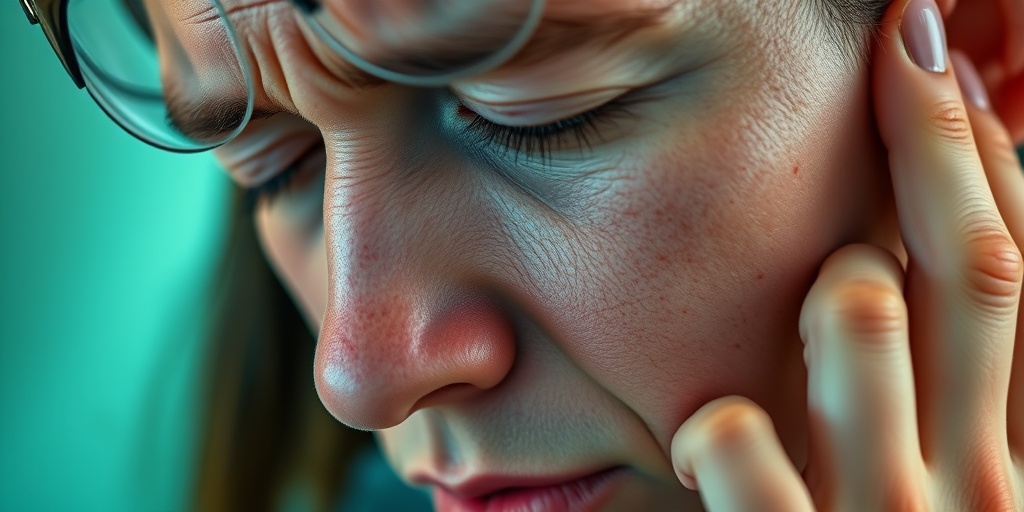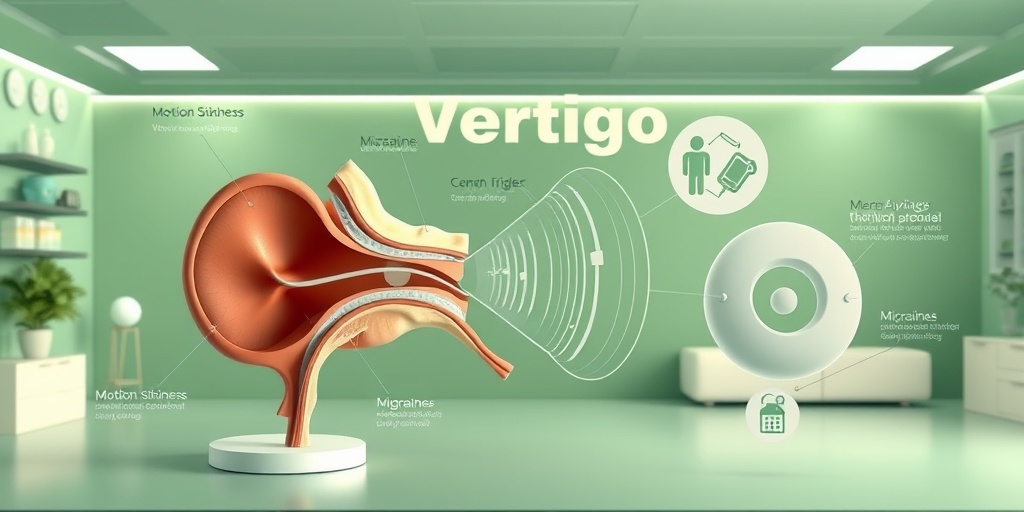What Is Vertigo?
Vertigo is a sensation that creates a false sense of movement, often described as feeling like you or your surroundings are spinning. This condition is not a disease itself but rather a symptom of various underlying issues. Understanding what is vertigo is crucial for identifying its causes and seeking appropriate treatment.
Typically, vertigo is categorized into two main types: peripheral vertigo and central vertigo. Peripheral vertigo is often linked to problems in the inner ear, while central vertigo is associated with issues in the brain. Common conditions that can lead to vertigo include:
- Benign Paroxysmal Positional Vertigo (BPPV): This is the most common cause of vertigo, triggered by changes in head position.
- Meniere’s Disease: A disorder of the inner ear that can lead to episodes of vertigo, hearing loss, and tinnitus.
- Vestibular Neuritis: Inflammation of the vestibular nerve, often caused by a viral infection.
- Cervicogenic Vertigo: This type is related to neck problems and can cause dizziness and balance issues.
Understanding the causes of vertigo is essential for effective management. If you experience recurrent episodes, it’s advisable to consult a healthcare professional for a thorough evaluation.
Vertigo Symptoms
The symptoms of vertigo can vary widely among individuals, but they typically include:
- Spinning Sensation: The hallmark symptom of vertigo is the feeling that you or your environment is moving or spinning.
- Dizziness: Many people describe a general sense of unsteadiness or lightheadedness.
- Nausea and Vomiting: The sensation of spinning can lead to feelings of nausea, and in some cases, vomiting.
- Balance Issues: Individuals may find it difficult to maintain their balance, leading to falls or difficulty walking.
- Tinnitus: Some may experience ringing in the ears, especially in cases related to Meniere’s disease.
These symptoms of vertigo can be triggered or worsened by certain movements, such as turning your head quickly or looking up. It’s important to note that vertigo can be accompanied by other symptoms depending on the underlying cause. For instance, if vertigo is due to a migraine, you may also experience headaches and sensitivity to light.
If you suspect you are experiencing vertigo, it’s crucial to seek medical advice. A healthcare provider may perform a vertigo test to determine the underlying cause and recommend appropriate vertigo treatment. Treatment options may include medications, physical therapy, or specific maneuvers designed to alleviate symptoms, such as the Epley maneuver for BPPV.
For more detailed information and resources on managing vertigo, consider visiting Yesil Health AI, where you can find evidence-based health answers tailored to your needs.
In conclusion, understanding vertigo and its symptoms is the first step toward effective management. If you experience any of the symptoms mentioned, don’t hesitate to reach out to a healthcare professional for guidance. Remember, you’re not alone in this journey, and help is available! 🌟

Types of Vertigo
Vertigo is a sensation that can leave you feeling as if you or your surroundings are spinning or moving. It’s important to understand that not all vertigo is the same; there are different types, each with its own characteristics and underlying causes. Here, we’ll explore the most common types of vertigo to help you better understand this perplexing condition.
1. Benign Paroxysmal Positional Vertigo (BPPV)
Benign Paroxysmal Positional Vertigo (BPPV) is one of the most common types of vertigo. It occurs when tiny calcium crystals in the inner ear become dislodged and move into the ear canals. This can lead to brief episodes of intense dizziness, especially when you change the position of your head. Symptoms often include:
- Sudden dizziness when tilting your head
- Feeling off-balance
- Nausea
BPPV is often treated with specific head movements known as the vertigo maneuver, which can help reposition the dislodged crystals.
2. Vestibular Neuritis
Vestibular Neuritis is an inflammation of the vestibular nerve, which can cause severe vertigo. This type of vertigo is often triggered by a viral infection and can last for several days. Symptoms may include:
- Severe spinning sensation
- Nausea and vomiting
- Difficulty with balance
Unlike BPPV, vestibular neuritis may require medication for treatment, including vertigo medication to alleviate symptoms.
3. Meniere’s Disease
Meniere’s Disease is a chronic condition that affects the inner ear and can lead to episodes of vertigo, hearing loss, and tinnitus (ringing in the ears). The exact cause of Meniere’s disease is unknown, but it is believed to be related to fluid buildup in the inner ear. Symptoms include:
- Recurrent episodes of vertigo
- Hearing loss
- Tinnitus
Management of Meniere’s disease often involves lifestyle changes, dietary adjustments, and sometimes surgical interventions.
4. Cervicogenic Vertigo
Cervicogenic Vertigo is a less common type of vertigo that arises from neck issues, such as cervical spine disorders. This type can be challenging to diagnose, as it often mimics other forms of dizziness. Symptoms may include:
- Dizziness triggered by neck movement
- Neck pain or stiffness
- Balance problems
Treatment typically focuses on addressing the underlying neck issues through physical therapy or chiropractic care.
Causes of Vertigo
Understanding the causes of vertigo is crucial for effective treatment and management. Vertigo can stem from various conditions, and identifying the root cause is essential for alleviating symptoms. Here are some of the primary causes:
1. Inner Ear Disorders
Many cases of vertigo are linked to disorders of the inner ear, which plays a critical role in maintaining balance. Conditions such as BPPV, vestibular neuritis, and Meniere’s disease fall into this category. These disorders can disrupt the signals sent to the brain about your body’s position, leading to dizziness.
2. Migraines
Migraine-associated vertigo is another common cause. Some individuals experience vertigo as a symptom of a migraine, even without a headache. This type of vertigo can be debilitating and may require specific migraine treatments.
3. Head Injuries
Trauma to the head can also lead to vertigo. Concussions or other injuries can affect the inner ear or brain, resulting in dizziness. If you’ve experienced a head injury and are feeling dizzy, it’s essential to seek medical attention.
4. Medications
Some medications can cause dizziness as a side effect. If you’re experiencing vertigo after starting a new medication, consult your healthcare provider to discuss potential alternatives or adjustments.
5. Other Medical Conditions
Various medical conditions can contribute to vertigo, including:
- Multiple sclerosis
- Stroke
- Vestibular schwannoma (acoustic neuroma)
These conditions may require specialized treatment and management strategies.
In conclusion, understanding the types and causes of vertigo can empower you to seek appropriate treatment and manage your symptoms effectively. If you or someone you know is experiencing vertigo, it’s essential to consult a healthcare professional for a proper diagnosis and tailored treatment plan. 🌟

Risk Factors for Vertigo
Understanding the risk factors for vertigo is crucial for prevention and effective management. Vertigo is not a condition itself but a symptom of various underlying issues. Here, we will explore the common risk factors associated with this dizzying sensation.
Age
As we age, the likelihood of experiencing vertigo increases. Older adults are more susceptible to conditions like benign paroxysmal positional vertigo (BPPV), which is one of the most common causes of vertigo. This condition occurs when tiny calcium crystals in the inner ear become dislodged, leading to episodes of dizziness.
Medical Conditions
Several medical conditions can heighten the risk of vertigo, including:
- Meniere’s Disease: This inner ear disorder can cause episodes of vertigo, along with hearing loss and tinnitus.
- Vestibular Neuritis: An inflammation of the vestibular nerve can lead to sudden vertigo.
- Cervicogenic Vertigo: This type of vertigo is linked to neck issues and can occur after neck injuries or chronic neck pain.
Medications
Some medications can have side effects that include dizziness and vertigo. It’s essential to consult with a healthcare provider if you notice these symptoms after starting a new medication. Common culprits include:
- Antidepressants
- Blood pressure medications
- Antibiotics
Head Injuries
Trauma to the head can disrupt the inner ear’s function, leading to vertigo. Even minor injuries can have lasting effects, so it’s vital to monitor any dizziness following a head injury.
Environmental Factors
Exposure to certain environments can trigger vertigo in susceptible individuals. For example, rapid changes in altitude, such as flying or scuba diving, can lead to episodes of dizziness. Additionally, being in crowded or visually stimulating environments may exacerbate symptoms.
Family History
If you have a family history of vertigo or related conditions, your risk may be higher. Genetic predispositions can play a role in the development of vestibular disorders.
Diagnosing Vertigo
Diagnosing vertigo involves a comprehensive evaluation to determine its underlying cause. Since vertigo can stem from various conditions, healthcare providers use a combination of methods to reach an accurate diagnosis.
Medical History Review
The first step in diagnosing vertigo is a thorough review of your medical history. Your doctor will ask about:
- The frequency and duration of your vertigo episodes
- Any associated symptoms, such as hearing loss or tinnitus
- Your medical history, including any previous head injuries or ear infections
Physical Examination
A physical examination is crucial in diagnosing vertigo. Your doctor may perform tests to assess your balance and coordination. This can include:
- Balance Tests: These tests evaluate your ability to maintain balance in various positions.
- Neurological Examination: This assesses your nervous system’s function, checking for any abnormalities.
Vestibular Testing
In some cases, specialized tests may be necessary to evaluate the inner ear’s function. These tests can include:
- Electronystagmography (ENG): This test measures eye movements to assess vestibular function.
- Rotary Chair Testing: This evaluates how well your inner ear and brain work together to maintain balance.
Imaging Studies
If the cause of vertigo remains unclear, your doctor may recommend imaging studies, such as:
- Magnetic Resonance Imaging (MRI): This can help identify structural issues in the brain or inner ear.
- Computed Tomography (CT) Scan: This can rule out other potential causes of dizziness.
Diagnosing vertigo can be complex, but with the right approach, healthcare providers can identify the underlying cause and recommend appropriate vertigo treatment. If you experience symptoms of vertigo, don’t hesitate to seek medical advice for a thorough evaluation. 🌟

Vertigo Treatment Options
Experiencing vertigo can be disorienting and distressing. Understanding the various vertigo treatment options available can help you regain your balance and improve your quality of life. Here, we’ll explore the most common treatments for vertigo, including medications, therapies, and lifestyle changes.
Medications for Vertigo
Several medications can help alleviate the symptoms of vertigo. These include:
- Antihistamines: Medications like meclizine and dimenhydrinate can help reduce dizziness and nausea associated with vertigo.
- Anticholinergics: Scopolamine patches can be effective for some individuals, particularly those who experience motion sickness.
- Benzodiazepines: Drugs such as diazepam may be prescribed for short-term relief of severe vertigo symptoms.
It’s essential to consult with a healthcare professional before starting any medication to ensure it’s appropriate for your specific condition.
Physical Therapy and Maneuvers
For certain types of vertigo, particularly benign paroxysmal positional vertigo (BPPV), specific physical maneuvers can be highly effective. The most common is the Epley maneuver, which involves a series of head and body movements designed to reposition the tiny crystals in the inner ear that cause vertigo.
Physical therapy can also include vestibular rehabilitation exercises, which help improve balance and reduce dizziness. These exercises are tailored to the individual and can significantly enhance stability and coordination.
Alternative Therapies
Some individuals find relief through alternative therapies, such as:
- Acupuncture: This traditional Chinese medicine technique may help alleviate vertigo symptoms for some.
- Chiropractic adjustments: Some people report improvements in their vertigo symptoms after spinal adjustments.
- Herbal remedies: Ginkgo biloba and ginger are often cited as natural remedies for dizziness and vertigo.
While these treatments can be beneficial, it’s crucial to discuss them with your healthcare provider to ensure they are safe and suitable for you.
Managing Vertigo at Home
Managing vertigo at home can be an essential part of your treatment plan. Here are some effective strategies to help you cope with vertigo symptoms and improve your daily life.
Creating a Safe Environment
One of the first steps in managing vertigo at home is to create a safe living space. Consider the following:
- Remove tripping hazards: Keep floors clear of clutter, and secure loose rugs to prevent falls.
- Install grab bars: Place grab bars in bathrooms and near stairs to provide support when needed.
- Use non-slip mats: These can help prevent slips in areas like the bathroom and kitchen.
Staying Hydrated and Nourished
Dehydration can exacerbate dizziness and vertigo symptoms. Ensure you drink plenty of water throughout the day. Additionally, maintaining a balanced diet rich in fruits, vegetables, whole grains, and lean proteins can support overall health and potentially reduce vertigo episodes.
Practicing Relaxation Techniques
Stress and anxiety can worsen vertigo symptoms. Incorporating relaxation techniques into your daily routine can be beneficial. Consider:
- Meditation: Spend a few minutes each day practicing mindfulness or meditation to help calm your mind.
- Deep breathing exercises: These can help reduce anxiety and promote relaxation.
- Gentle yoga: Certain yoga poses can improve balance and reduce stress.
Keeping a Symptom Diary
Tracking your symptoms can provide valuable insights into your vertigo triggers. Note when episodes occur, their duration, and any associated activities or dietary choices. This information can be helpful for your healthcare provider in determining the best treatment plan for you.
By implementing these home management strategies and understanding your treatment options, you can take proactive steps toward managing your vertigo effectively. Remember, always consult with a healthcare professional for personalized advice and treatment plans. 🌟

Frequently Asked Questions about Vertigo
What is Vertigo?
Vertigo is a sensation of spinning or dizziness that occurs when there is a disturbance in the balance system of the inner ear or the brain. It can make you feel as though you or your surroundings are moving when they are not.
What are the common causes of Vertigo?
- Benign Paroxysmal Positional Vertigo (BPPV): A common cause where tiny crystals in the inner ear become dislodged.
- Meniere’s Disease: An inner ear disorder that can lead to episodes of vertigo, hearing loss, and tinnitus.
- Vestibular Neuritis: Inflammation of the vestibular nerve, often following a viral infection.
- Cervicogenic Vertigo: Dizziness that arises from neck problems.
What are the symptoms of Vertigo?
The symptoms of vertigo can include:
- A spinning sensation
- Loss of balance or unsteadiness
- Nausea or vomiting
- Tinnitus (ringing in the ears)
- Difficulty focusing
How is Vertigo diagnosed?
Diagnosis of vertigo typically involves a physical examination, a review of medical history, and specific tests such as the Vertigo Test or balance assessments to determine the underlying cause.
What are the treatment options for Vertigo?
Treatment for vertigo depends on the underlying cause. Common options include:
- Vestibular Rehabilitation Therapy: Exercises designed to improve balance and reduce dizziness.
- Medications: Such as antihistamines or anti-nausea drugs to alleviate symptoms.
- Canalith Repositioning Maneuvers: Specific movements to help reposition the crystals in the inner ear.
Are there exercises for Vertigo?
Yes, there are specific vertigo exercises that can help manage symptoms, such as the Epley maneuver for BPPV. These exercises are designed to help your body adapt to the changes in balance.
Is there a medication for Vertigo?
There are various vertigo medications available, including antihistamines and anti-nausea medications. It’s essential to consult a healthcare professional for the appropriate treatment based on your specific condition.
Can Vertigo be a sign of a more serious condition?
While vertigo is often benign, it can sometimes indicate a more serious condition, such as a stroke or a brain tumor. If you experience sudden or severe vertigo, it is crucial to seek medical attention promptly.
What lifestyle changes can help manage Vertigo?
Making certain lifestyle changes can help manage vertigo symptoms, such as:
- Avoiding sudden head movements
- Staying hydrated
- Limiting caffeine and alcohol intake
- Practicing balance exercises regularly
When should I see a doctor for Vertigo?
If you experience frequent episodes of vertigo, or if it is accompanied by other concerning symptoms such as severe headache, vision changes, or difficulty speaking, it is important to consult a healthcare professional.




